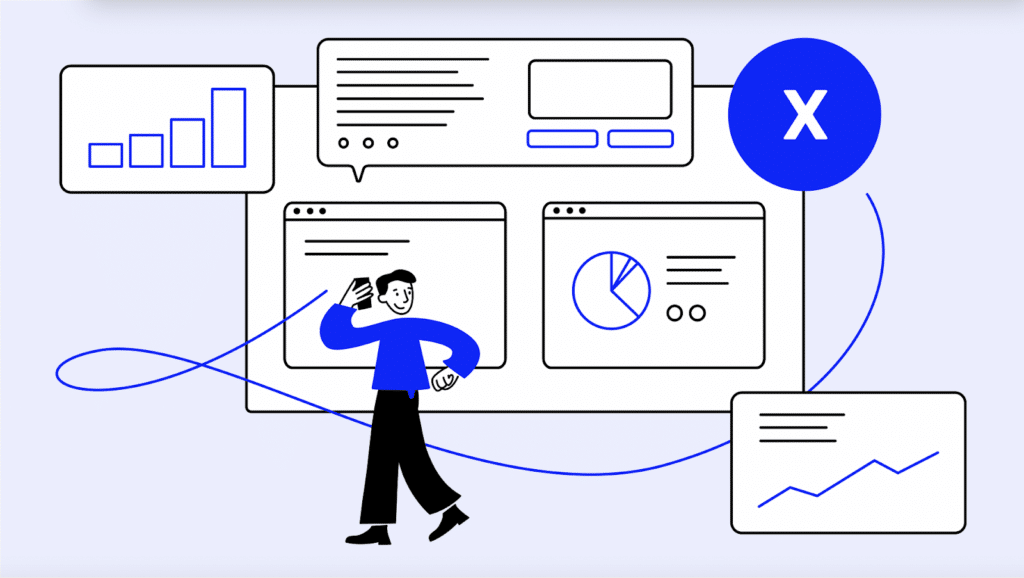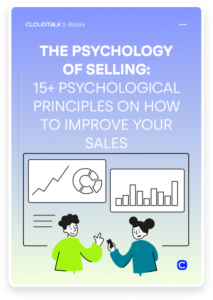9 B2B Sales Tools Industry Professionals Use to Close More Deals

Nowadays, sales reps have access to dozens — if not hundreds or even thousands — of sales tools to help them automate day-to-day processes, save time, and boost efficiency.
But this has come with its own set of challenges. Namely, how do you choose the best sales tools for you?
Ideally, you’d want to ask a friend, colleague, or fellow professional. But on the off-chance that’s not possible, we took it upon ourselves to do the asking for you. In this article, we’ll explore the various sales tools available on the market today, highlight sales professionals’ favorites, and provide you with their testimonials.
But first, let’s answer a rather obvious question…
What is a Sales Tool?
Simply put, a sales tool is any resource, software, or application that companies use to help them sell more of their products or services. To achieve this, sales tools help make the sales process more efficient by optimizing tasks relevant to their specific use case.
This can include speeding up lead generation and prospecting, simplifying customer management, tracking deals, creating detailed reports, etc. Today, sales reps sell digitally. Whether you use tools to prospect on LinkedIn or to promote your sales webinars, below, we’ll discuss the most important sales tools and give a brief overview of each one before diving into our professionals’ recommendations.
Types of Sales Tools
Although sales can seem deceptively simple to define, identifying what is “sales” and what isn’t is a bit harder to do. What you consider a “sales tool” ultimately comes down to your personal opinion, with the field being as wide or narrow as you want it to be. But for this article, we decided to look at the 10 most common types of sales tools.
- Customer Relationship Management (CRM) Software: CRM software manages customer interactions and data. Companies can use it to track leads, manage deals, and generate reports.
- Email Marketing Tools: Email marketing tools help sales teams manage campaigns, track emails, and analyze results. They can also generate a unique email signature to maintain a professional and consistent brand identity across communications.
- Sales Automation Tools: Sales automation tools automate certain sales tasks, such as lead scoring, follow-up emails, and appointment scheduling.
- Sales Training Tools: Sales training tools help sales teams develop and refine their skills, such as through online courses, workshops, and coaching sessions. You can use ready-made options or create your own materials using online course builders, whiteboards, and other tools.
- Sales Enablement Tools: Sales enablement tools are resources and materials that help sales professionals be more effective in their roles, such as product guides, case studies, and sales scripts.
- Social Media Management Tools: Social media management tools help sales teams manage their social media presence, track mentions, and analyze engagement.
- Call Tracking and Recording Software: Call tracking and recording software is used to track and record phone calls made by sales teams, which can be used to improve customer interactions and training.
- Sales Forecasting and Analytics Tools: Sales forecasting and analytics tools provide insights into sales performance, customer behavior, and market trends.
- Sales Proposal Software: Sales proposal software helps sales teams create professional proposals and presentations, which can help them close deals more effectively.
- Lead Generation Tools: Lead generation tools help sales teams find and qualify leads, which can help them generate more business.
9 Sales Tool Recommendations by Industry Professionals
And here we are, the part of the article you’ve been waiting for. As promised, we asked 10 sales experts to give us their recommendations for the best sales tools they use regularly, and they’ve delivered. So, without further ado, let’s dive right in.
#1 Close | Recommended by Kate Petrone, Senior Account Executive
What sales tool do you use for your B2B core sales activities and why?
Close CRM – A specialty tool built for salespeople 🚀 Close combines our core CRM needs (Lead/Pipeline Management, Reporting) with all of our communication channels in one place (call, email, SMS, meeting sync). This, in turn, allows us to be quick and efficient with our follow-up process, increase our productivity, and ultimately close more deals.
Which 2-3 factors persuaded you to choose this specific tool?
- Ease of use/quick adoption rate. Using the same product we sell at Close gives us a unique perspective here.
- Simplified stack. Close allows us to eliminate add-ons for Calling/SMS or Email Automation, as it’s all built into one product, with the bonus that we get to work off of one screen.
- Automation. Features like Sequences, Smart Views, and Power Dialing allow us to touch more Leads and close more deals.
#2 Salesforce | Recommended by Christa Reed, Head of Job Market Research at Job Searcher
& Mile Zivkovic, Head of Content at Whatagraph
Christa Reed:
What sales tool do you use for your B2B core sales activities and why?
“I use Salesforce as our primary sales tool for B2B core sales activities. Salesforce helps us track leads and opportunities, manage sales pipelines, and generate forecasts and reports. It helps to automate the sales process by providing automated lead scoring.“
It also makes tracking customer activity, following up on sales leads, and managing customer relations easier. It streamlines managing customer data, such as contact information, order history, and product preferences. Salesforce enables us to understand customer needs and preferences better and tailor our sales strategy accordingly.
Which 2-3 factors persuaded you to choose this specific tool?
The two main factors that persuaded us to choose Salesforce were its comprehensive feature set and its ease of use. With Salesforce, we can easily access the information we need to effectively manage our sales efforts and keep track of customer interactions. Salesforce provides a user-friendly interface, so we can quickly navigate the system and find the necessary data.
Is this tool missing something?
Salesforce does have a number of features that are specific to Human Resources (HR) businesses, such as the ability to track employee data, create performance reviews and surveys, and manage employee onboarding. But we miss some of the more advanced HR features such as payroll management, a applicant tracking system, and employee scheduling.
Mile Zivkovic:
What sales tool do you use for your B2B core sales activities and why?
We use Salesforce for mapping out our sales processes so we have a clear representation of our sales funnel and how it works. It helps us determine who our customers are and which channels they come from.
Which 2-3 factors persuaded you to choose this specific tool?
It has all the data points we need to make educated sales and marketing decisions. The setup can seem lengthy and complicated, but there is no other tool out there that provides such as the wealth of data from so many different sources.
Is this tool missing something?
Not really – it just may be a bit complex for the average user.
#3 Snov.io | Recommended by Yulia, Outreach Specialist
What sales tool do you use for your B2B core sales activities and why?
“With a highly competitive B2B sales environment, the main pain point of many businesses is a constant supply of quality leads in sufficient quantities. To place an equal sign between quality and quantity, we rely greatly on Snov.io toolset. Its impressive ecosystem duplicates literally every stage of the sales cycle, but most importantly, focuses on omni-сhannel search of prospects with its Email Finder app or Email Finder Chrome extension.”
What’s more, you can immediately verify and sift through unnecessary emails with Snov.io Email Verifier ensuring the ultimate quality of leads thanks to a thorough 7-tier verification process. Last but not least, all the follow-ups are completely automated and powered by a personalized email outreach so that your business follows the customer-centric sales model.
Which 2-3 factors persuaded you to choose this specific tool?
To be completely just, the most prominent feature for me is Snov.io email authentication. The system can verify your prospect’s contact information and identify their companies or websites. Once you have this information, you can create unique, customized pitches for higher chances of conversions. Many automation tools offer similar services, but only Snov.io seems to provide accurate, updated information directly linked to decision-makers.
Is this tool missing something?
Well, as much as I love Snov.io Email Finder functionality and its great features of finding leads almost everywhere by industry, company size, location, name, domain, on company websites, or an entire network, I´d comment on its insufficient social media search.
Even though you may find leads with Email Finder on LinkedIn and Twitter, other social media channels, such as Facebook, for instance, are not covered. At the same time, emails may require verification unless found on professional social networks. Finally, Email Finder coming on a free plan, is quite limited in credits, export, and integrations.
#4 Mixmax | Recommended by Virginia Zacharaki, Senior SEO Specialist at Moosend
What sales tool do you use for your B2B core sales activities and why?
“Mixmax – it helps us to nurture our B2B inbound leads.“
Which 2-3 factors persuaded you to choose this specific tool?
Price, features, and ease of use. We have been with them for several years, and they have grown commensurate with our needs from a feature and function perspective.
Is this tool missing something?
Ability to customize the precise time (down to the minute) when we want to send our follow-ups. Also, it would be great if it could change the Salesforce status for Leads at the end of automation.
#5 Streak | Recommended by Anton Liaskovskyi, CEO of AdPlayer.Pro
What sales tool do you use for your B2B core sales activities and why?
“Being an out-stream video advertising tech provider, we need a feature-rich CRM to keep our pipeline moving, and the Streak solution we’re currently using in our daily sales management routine works out just fine.”
Which 2-3 factors persuaded you to choose this specific tool?
Namely, its existing functionality enables us to keep all the lead management data and sales process under control, particularly due to the use of its flexible and comprehensive input capabilities.
#6 SmartTask | Recommended by Shyamal Parikh, Founder of SmartTask
What sales tool do you use for your B2B core sales activities and why?
“We use our own tool—SmartTask, for all of our internal sales activities. SmartTask is actually a work management platform that also has the capabilities of a CRM. It helps you manage contacts, track inquiries throughout the sales pipeline, predict sales, and monitor sales progress on a CRM dashboard.”
SmartTask acts as a central hub for sales executives to keep track of their tasks, projects, lead data, sales pipeline, internal communication, document management, analytics, and reporting.
Which 2-3 factors persuaded you to choose this specific tool?
1. Project & task management, CRM, and team communication in one platform
2. Easy to set up and no learning curve
3. Cost-effective
#7 Scribe | Recommended by Isabela William, Growth Specialist at Scribe
What sales tool do you use for your B2B core sales activities and why?
Scribe is an AI-powered tool that documents any process for you. Scribe uses ChatGPT to turn your workflows into sales training and enablement materials that show not just how to do the work, but why.
Sales training is a continuous process that every organization should prioritize to stay ahead of the competition. Scribe amplifies your training program by turning any process into a step-by-step guide, so it’s easier than ever for reps to understand sales processes and how to use sales tools.
Which 2-3 factors persuaded you to choose this specific tool?
Scribe turns even the most complicated process into an easy-to-follow step-by-step guide you can edit and share in seconds. Just turn on the extension, capture your screen and Scribe will build a document that you can customize, share, or combine with video, images, and more.
You can use the AI to build step-by-step training guides on everything from product demos to sales techniques, onboarding training, sales process docs, and SOPs–any training and enablement you need. It saves a ton of time and equips reps with better training.
#8 QuickMail | Recommended by Elmeri Palokangas, SEO Coordinator at QuickMail
What sales tool do you use for your B2B core sales activities and why?
QuickMail = Cold outreach for guest posting and link partnerships. With QuickMail’s native integration with MailFlow, we also improve our email deliverability, which makes our outreach process more efficient.
Trello = To keep track of all the projects going on, as well as to know which companies to target later on.
Notion = To create operating manuals for new hires as well as existing employees.
Sendfox = To send out our weekly email newsletters.
Which 2-3 factors persuaded you to choose this specific tool?
QuickMail = High email deliverability, good sequencing tools, and easy A/B testing.
Trello = Good user interface, easy to understand without any experience, and works as a team.
Notion = Quick to build manuals, affordable to use, and includes everything necessary (and nothing that is not necessary).
Sendfox = Includes all the necessary statistics that are necessary for newsletters.
#9 HubSpot, Recommended by Shruti Kesavan, Content Marketing Lead at Fyle
What sales tool do you use for your B2B core sales activities and why?
Hubspot – To track the customer journey, leads, ARR, reporting and analytics, and more.
Intercom – To track conversations and lead qualifications.
Fyle – To manage all business expenses, mileage, cash advances, and per diems incurred by sales and traveling employees.
Zapier – To manage and automate all redundant tasks and subtasks.
Which 2-3 factors persuaded you to choose this specific tool?
1. Price point that is justifiable
2. Intuitive software that does not have a learning curve
3. Reviews – based on review sites
4. We personally test-drive a bunch of tools before we settle for one.
Take a deep dive into the psychology of selling

What did you find in this article?
What are B2B Sales tools?
B2B sales tools are softwares or applications that help businesses in managing their sales process effectively.
They can include customer relationship management (CRM) software, lead generation tools, email marketing automation, analytics, and more.
How can B2B sales tools help my business?
B2B sales tools can help your business in several ways. They can automate tedious and time-consuming tasks, such as lead generation, email campaigns, and follow-ups, freeing up your sales team’s time.
They can also provide data-driven insights, such as sales forecasting and pipeline analysis, which can help you make informed decisions and improve your sales performance.
How do I implement B2B sales tools into my sales process?
Implementing B2B sales tools into your sales process requires careful planning and coordination. First, identify which tools you need and select the vendors that offer them.
Then, train your sales team on how to use the tools effectively, and integrate them into your existing workflows and processes. Finally, establish metrics and KPIs to measure the impact of the tools on your sales performance and adjust your approach as needed.

























